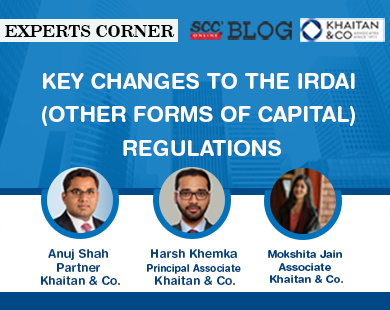The Insurance Regulatory and Development Authority of India (IRDAI), under the chairmanship of Mr Debashish Panda, has set out to make reforms to the insurance sector to promote the growth of the industry. These reforms, inter alia, aim to reduce the compliance and regulatory burden on insurers, provide more flexibility and an effective regulatory framework.
One such change is the notification of the IRDAI (Other Forms of Capital) Regulations, 2022 (new Regulations) on 5-12-2022, which supersedes the IRDAI (Other Forms of Capital) Regulations, 2015 (erstwhile Regulations).
Set out below is a list of key changes made under the new Regulations:
- ApplicabilityIt has been clarified that the Regulations are applicable to all the insurers other than the foreign reinsurers’ branches.
- Requirement of prior approval
(i) Insurers are now permitted to issue other forms of capital without obtaining prior approval from the IRDAI.
(ii) Prior approval will only be required for payment of dividend/payment of interest if: (i) the solvency is below the minimum requirement; (ii) the impact of such accrual or payment would result in the solvency level falling below the minimum requirement; or (iii) the impact of such accrual or payment of interest would result in net loss or an increase in the net loss.
This is a very positive step which will allow insurers to quickly raise capital while also ensuring that they are not overleveraged and continue to maintain a healthy solvency ratio.
- Conditions for issue of “other forms of capital”
(i) For ease of readability and understanding, the conditions for issuance of other forms of capital, which were earlier spread across the erstwhile Regulations, have been clubbed under one head.
(ii) A key change is the requirement that preference shares are required to be non-convertible in our opinion, this is likely to reduce the interest of foreign investors in investing through preference shares due to the compliance requirements under the exchange control regulations.
(iii) Separately, the list of the subscribers eligible to invest in other forms of capital does not include “foreign promoters”, however, one will have to gauge the intention of the IRDAI and positively interpret “foreign investors” to include reference to “foreign promoters” as well.
(iv) Conditions such as the instruments being fully paid up and unsecured, no incentives for early redemption, fixed rate or a floating rate of interest, maintenance of minimum solvency requirements and interest to be charged to the profit and loss account, remain the same as the erstwhile Regulations.
- Limit for “other forms of capital”
(i) While the limit for the total quantum for raising “other forms of capital” has been increased from 25% to 50% (of the total paid-up equity share capital and securities premium account), the requirement to maintain a net worth of 50% has been retained.
(ii) This will help insurers raise greater amounts of “other forms of capital” without any regulatory intervention.
- Callback of instruments
(i) Under the new Regulations, a “call option” on the instruments can now be exercised without prior approval from the IRDAI. Prior approval is to be sought only if after exercising such call option, the solvency position of insurer is not, at least 20% above the solvency requirement.
(ii) The insurer needs to notify the IRDAI within 15 days of exercise of a call option.
(iii) Separately, it has been clarified that non-payment of interest and non-repayment of the redemption amount of the subordinated debt, cannot be construed to be an event of default.
- Investment by insurer in “other forms of capital” of another insurer
(i) It is pertinent to note that as per the new Regulations, an insurer investing in “other forms of capital” of another insurer will not qualify such investment as an “admissible asset” for determining its solvency level — this seems to be a downside and may discourage participation by insurers in subscribing to preference shares and subordinated debt in other insurers.
(ii) However, it has been clarified that existing investments in “other forms of capital” will continue to be admitted towards the calculation of available solvency till such investments are transferred/redeemed.
(iii) Separately, an insurer will not be permitted to invest in the instruments issued by another insurer, if the two insurers have a common promoter — this will ensure that the promoter invests directly in the insurer rather than investing through its other investee Insurance Company.
- Sunset clauseIn line with IRDAI’s recent practices, the new Regulations also have a sunset clause of 3 years. Inclusion of such a clause alludes to the IRDAI’s intention to revisit these Regulations based on the market experience.
The new Regulations are a progressive step and a welcome attempt. While the erstwhile Regulations provisioned for raising other forms of capital by issuance of compulsorily convertible preference shares and subordinated debts, the approval process was cumbersome and only few insurers were able to secure approval for raising capital by issuance of subordinated debt. Further, no approval was granted permitting insurers to raise capital by issuance of compulsorily convertible preference shares. With the added flexibility of being able to raise other forms of capital (in terms of relaxation of approval requirement and increasing the limit for issuance of “other forms of capital”), we anticipate this route to become more popular, will allow for more participation from various segments of investors and will give a boost to investment in the sector.
† Partner, Khaitan & Co.
†† Principal Associate, Khaitan & Co.
††† Associate, Khaitan & Co.







